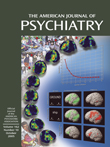Neuropsychological Performance in Schizotypal Personality Disorder: Importance of Working Memory
Abstract
Background: Cognitive deficits consistently have been reported in schizophrenia patients and in patients with schizotypal personality disorder. For this study, the authors wanted to identify which of the domains of cognitive impairment represent “core” deficits of schizophrenia, comparing subjects with schizotypal personality disorder to two comparison groups: healthy volunteers and patients with personality disorders unrelated to schizophrenia. METHOD: Three groups completed a neuropsychological battery: patients with DSM-III-R schizotypal personality disorder (N=82); patients with DSM-III-R personality disorders unrelated to schizophrenia (i.e., a personality disorder other than schizotypal, schizoid, or paranoid [N=44]); and healthy volunteers (N=63). The battery included the California Verbal Learning Test, Trailmaking Test parts A and B, the Dot test of working memory, the Stroop Color and Word Test, the Paced Auditory Serial Addition Test, the WMS visual reproduction test, and the WAIS-R vocabulary and block design. RESULTS: Normative standards for performance that controlled for age, gender, and education were created from the scores of the healthy volunteers. Overall, schizotypal personality disorder patients performed significantly worse than the healthy volunteers and those with personality disorders unrelated to schizophrenia. Specifically, patients with schizotypal personality disorder demonstrated impaired performance on the Paced Auditory Serial Addition Test, WMS visual reproduction test, Dot test, and California Verbal Learning Test. In addition, in a regression analysis, performance on the Paced Auditory Serial Addition Test demonstrated the largest effect size. Indeed, it accounted for unique variance above and beyond all other cognitive measures, since controlling for Paced Auditory Serial Addition Test performance abolished group differences across all other measures. CONCLUSIONS: Patients with schizotypal personality disorder demonstrated moderate cognitive impairment compared with healthy volunteers (significant for seven out of 11 measures). These differences reached statistical significance for tasks of working memory, episodic memory, and delayed recall. Working memory performance accounted for the group differences. This study supports the view that working memory represents a core deficit of schizophrenia spectrum disorders.



